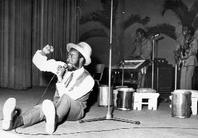Kavelle Anglin-Christie, Staff Reporter

BIG YOUTH: Top Recording star Big Youth goes down flat on his rear with mike in hand to illustrate 'Sitting in the Dock of the Bay' during his performance at the Regal Theatre at a show in 1973.
Born Manley Augustus Buchanan in 1949, Big Youth has lived a full life. Buchanan grew up in the heart of the Kingston inner city and made his debut during the heyday of
U-Roy and his rival I-Roy. In no time he almost eclipsed them with his hits S.90 Skank and Every Nigger is a Star and went on to become one of reggae's legends. The peak of his glory days may be behind him, but they are certainly not forgotten.
Sunday Gleaner: Is it true that you were the first reggae artiste to sport dreadlocks on stage and on album covers?
Big Youth: Yes, it's true. It was my conviction, so that's why I did it.
SG: Do you think you are overlooked and underrated by this generation?
BY: I wouldn't say that. I give thanks for the joyous life that I have had and I give thanks. It's just that some in the system would rather push lies to the people than the truth. Some of them would
prefer to sing nonsense to the
people and not love and harmony to people, only badness.
SG: How did you get your stage name?
BY: Well, I used to do mechanic work and I was usually round the bigger men and them used to call me 'youth'. So one of the youths in my community that was smaller than me said, 'how come you so big and them call you youth?' So that's how I got the name.
SG: When did your big break come?
BY: It was in late '71 to '72, when S.90 Skank came out.
SG: Was reggae played a lot on radio back then?
BY: Not really. But when this phenomenon came, that's what people called me and my music, it was an open thing. I was telling people to make love, not war, and I basically control the two radio stations. I bring uptown downtown and help to break that barrier.
SG: Do you still have red, green and gold jewels
embedded in your teeth?
BY: I have them from 1972 until now. This bling bling thing, me start it; but me nuh follow hype, me just come fi do what I do.
SG: Is it difficult to maintain them?
BY: No man, mi dentist set them in proper. Sometimes I lose some nice stones and have to replace them though.
SG: What do you think was the highest point in your career?
BY: Well, living 30-odd years in the public life, from the '70s all the way up to the '80s. It was a nice time. All back in '73 when I went to Madison Square Gardens and mash it up, that was good.
SG: Are you married?
BY: No. I have a lot of disappointments. I am happy being
single. I'm a lover, but I don't believe in matrimony. It's not
religion, because that's just a label ... I'm not a Romeo, but I'm looking for my Juliet.
SG: What is the biggest issue in Jamaican music that you would like to see addressed and remedied?
BY: People must know what they say, especially around the future generation. Some of these people are good singers, but are promoting nonsense to the next generation.
SG: If you were to die tomorrow, how would you like to be remembered?
BY: The good that you do will live with you. No matter what, I try to keep on doing good to all. I like to celebrate life, because I don't know the road to death. I want to be remembered for great things.
SG: What's in store for your career now?
BY: I just did an album called Musicology for Vision Sound out of Guyana. Now I'm looking to work on the next album.

